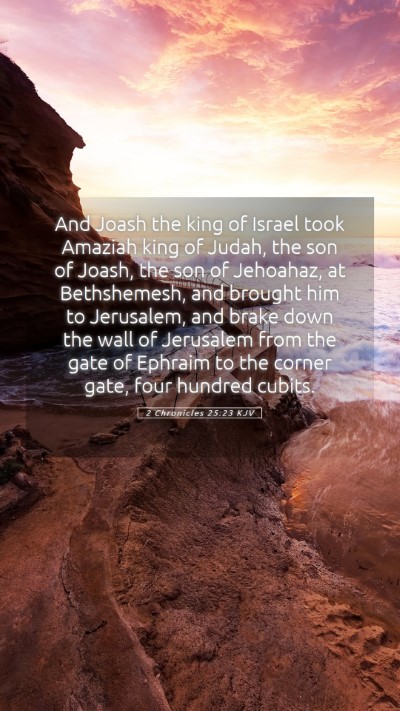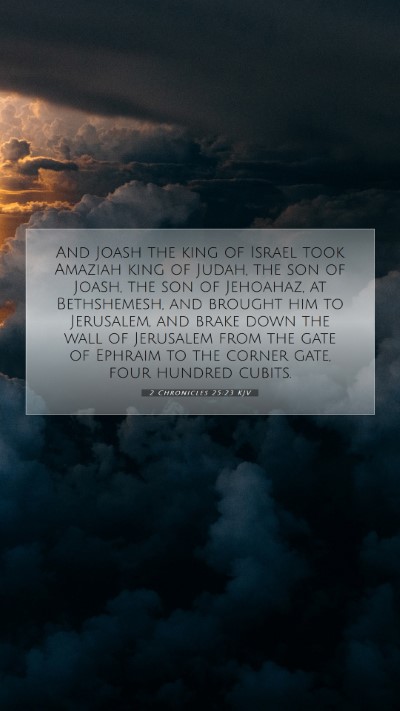Understanding 2 Chronicles 25:23: A Bible Verse Commentary
This study offers a comprehensive Bible verse explanation of 2 Chronicles 25:23, utilizing insights from respected public domain commentaries including those by Matthew Henry, Albert Barnes, and Adam Clarke. Our aim is to assist anyone seeking Bible verse meanings, Bible verse interpretations, and biblical exegesis for deeper understanding Scripture.
Verse Context
2 Chronicles 25:23 states:
"And Joash the king of Israel took Amaziah king of Judah, the son of Joash, the son of Ahaziah, at Bethshemesh, and brought him to Jerusalem, and brake down the wall of Jerusalem from the gate of Ephraim to the corner gate, four hundred cubits."
This passage marks a significant moment in the history of Israel and Judah, illustrating the conflict and the political dynamics in the region. It tells of the defeat of Amaziah, the king of Judah, by Joash, the king of Israel, and the destructive consequences of this confrontation.
Commentary Insights
The verse provides a vivid account of military defeat and its implications. Here's a breakdown of its meaning based on the interpretations by various scholars:
-
Matthew Henry:
Henry highlights the folly of Amaziah in seeking to ally with Israel through his military endeavors. He emphasizes that God’s judgment was evident in this event, as Amaziah had turned away from faithfulness to God, leading to disaster for his kingdom.
-
Albert Barnes:
Barnes discusses the significance of Joash’s actions, illustrating the power struggle between the northern kingdom of Israel and the southern kingdom of Judah. Joash’s military success was portrayed as a direct result of God’s sovereignty, allowing Israel to conflict with Judah due to their leaders' sins.
-
Adam Clarke:
Clarke provides historical context to the events. He notes that the destruction of Jerusalem’s wall signifies the seriousness of the conflict and represents a low point in Judah's political and spiritual state, warning of future consequences if the people do not return to God.
Major Themes
This passage encapsulates several key themes in Scripture:
-
Divine Judgment: The defeat of Amaziah is tied to the idea of divine judgment resulting from disobedience.
-
Political Conflict: The verse illustrates ongoing conflict between the kingdoms of Israel and Judah, highlighting the instability of the time.
-
Importance of Faithfulness: The history recounted serves as a reminder that faithfulness to God is crucial for success and stability.
The Significance of Wall Breakdown
The act of breaking down the wall of Jerusalem signifies much more than military might; it represents vulnerability, loss of identity, and the harsh realities of war, implicating the spiritual state of Judah and its people. As expressed by these scholars, the physical act of devastation corresponds to the spiritual disarray that came as a result of forsaking God.
Applications to Daily Life
For those engaged in Bible study groups or seeking online Bible study resources, the verse encourages reflection on personal faithfulness and the consequences of straying from God’s path. The lessons learned from Amaziah's failure can serve as cautionary tales in our modern-day challenges:
- Evaluate alliances and relationships in life; seek those who align with God’s principles.
- Recognize the importance of maintaining spiritual barriers that protect our faith.
- Understand the long-lasting consequences of choices made outside of divine guidance.
Cross References
This verse is related to several other passages for further study:
- 2 Kings 14:11-14 - Detailed account of Amaziah's military engagements.
- Isaiah 17:1 - Prophetic warning about judgements on nations.
- Jeremiah 39:8-9 - Context about the fall of Jerusalem and its ramifications.
Conclusion
In summary, 2 Chronicles 25:23 serves as a powerful reminder of the intersection between faith, leadership, and divine accountability. It offers rich Bible study insights for anyone seeking a deeper understanding of Scripture, encouraging believers to reflect on their own spiritual choices and the importance of faithfulness. Through this detailed exploration of the verse, we hope to equip readers with knowledge that fosters personal growth in their Bible study lessons.


